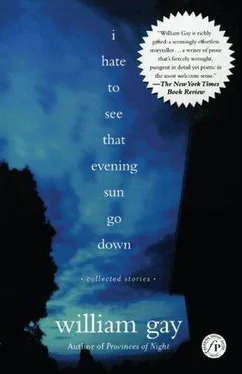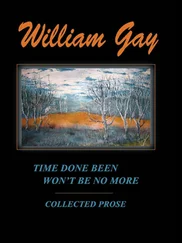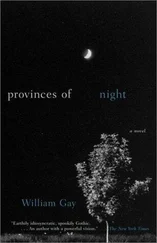He put the cigarette out in an urn half filled with sand and went back inside the waiting room and took up a copy of Newsweek . He tried to read an article on a new survey of sexual habits but the sheer amount of work that had gone into producing the magazine he held in his hands made him tired. Lumberjacks had felled trees that had been shredded and pulped to make paper. Ink had to come from somewhere. Other folks ran presses, stacked the glossy magazines, delivered them; the U.S. Mail shuttled them across the country. Not to mention the people with cameras and word processors, people with curiosity and the knowledge to ask the questions to satisfy it. The magazine grew inordinately heavy, all these labors had freighted it with excess weight. He could hardly hold it. All the information was encoded in bits that swarmed like electronic insects and the words flew off the page like birds. He sat staring at an advertisement for a red Blazer that he was convinced was the very truck that had brought him to Nashville.
When she came through the doorway back into the waiting room, days seemed to have passed. He’d laid the magazine aside and sat clutching her purse. Reaching it to her he pretended not to study her but he did all the same. Having learned nuance and shading he’d become adept as well at interpreting her body language. Her smile was a little bright, her movements a little mannered: she’d put on the restraints and maybe screwed them down a notch too tight.
Ready? she asked.
More than, he said, scanning the room one last time as if he’d mark it as a place to avoid, remember all these miscast faces should he ever encounter them in old movies on late-night TV.
They went out. The cars in the parking lot glared under the sun. He felt hollow and enormous inside.
She was reaching for the door handle of the Blazer when he stopped her with a hand on her arm.
Wait, he said.
Wait? For what?
He was silent a time. Tell me something, he finally said.
I guess there’s not much to tell.
Was it bad?
She had her lower lip caught between her teeth. About as bad as it gets, she said.
He thought for a moment her eyes looked frightened then he saw that more than fear they showed confusion. She looked stunned, as if life had blindsided her so hard it left her knees weak and the taste of blood in her mouth. He wanted to cure her, save her, jerk her back from the edge as she’d tried to do for him.
But all he could say was, Do you want me to drive?
I’m fine, she said. I can always drive. I like to drive.
Behind the wheel she searched her purse for the keys. I’m starved, she said. Are you hungry?
Yes, he lied.
Where do you want to eat?
She had the keys, the Blazer caught on the first crank, then sat idling. She studied him intently.
I don’t care, he said.
You must care.
I don’t care, it’s nothing, it’s just food. Hell, it’s just food. He knew she thought that was a barbaric notion but that was just the way he felt.
Where was that little Italian place we went to? You had the veal, they had these great salads there. Terrific salads. What was the name of that place?
I don’t know.
You must know. The salads had the little cherry tomatoes?
Goddamn it, he said, suddenly angry. They all have the little cherry tomatoes.
She knew him, she wasn’t fooled, she didn’t take offense. She smiled. I can find it, she said. We’ll just drive around, I’ll know it when I see it.
I still don’t see what it matters.
It matters to me, she said. It was the first time we ever went out to eat. You know, in a nice place. You bought me a bottle of wine you couldn’t afford.
As she drove back into the street, she kept looking at the buildings, cutting down narrow crooked alleys, taking side streets that seemed to go nowhere you’d want to be — as if the place where they had the cherry tomatoes would materialize before her, between the tacky country music souvenir stores with their ceramie Roy Acuffs and price-tagged Minnie Pearl hats and the interminable pawnshops in whose dust-moted windows guitars hung by their necks like arcane beasts taken as trophies.
The day was waning, the light stingy and oblique. The sun flared behind the buildings and lent them a stark undimensioned quality. After a while they were hopelessly lost. The city looked strange even to her. They didn’t speak. It began to seem to Worrel that they had sought and found their own level.
They trickled down sunless corridors and burst capillaries until they were in the city’s dark heart. A city within the city where the blood slowed and thickened and clotted in viscous smears of alizarin crimson dried to burnt sienna around the edges. The tires of automobiles bore it away in fading hieroglyphic slashes. Neon flared, the air had grown heavy with the drone of flies, BAR BAR BAR, the neon repeated. 20 NAKED GIRLS 20. Brands of beer seemed to have the significance of the names of prophets on graven tablets.
Finally she pulled the Blazer to the curb and cut the switch and stared uncertainly about her. They had parked next to a vacant lot. Dead weeds tilted askew by the winds, the sun caught in broken wine bottles. The husk of an Eldorado sat so stripped and demolished it seemed to suffer obsolescence on an epidemic scale. A brown dog came out of the weeds and stood staring at them as if it had news of their coming. It was starved to the point of emaciation, just something that stood for a dog, a concentration that might possibly reconstitute a dog, a dog decocted in smoking electric chambers by a mad doctor who’d seen a dog once long ago and conjured one up with only the vagaries of memory as a recipe.
Adjacent to the vacant lot was a row of buildings constructed of umber-colored brick. Between two of them a narrow two-story house was wedged so tightly it seemed to have no sides of its own, simply its wooden frame front and tin-roofed porch hung parasitically between the brick walls, the rococo gingerbread trim of the porch paintlorn and rotting. A swing dangled motionless from rusted chains. The front window had been stoned out and covered with a metal sign that read CLABBER GIRL BAKING POWDER. A cracked sidewalk led to the street through packed earth encysted with bottle caps. Venus flytraps grew in car-tire planters serrated as if pinked by enormous shears.
The streets were full of drifters who seemed to be looking for something that they had lost. The homeless by choice and by circumstance held in common their disconnectedness and the self-same look of threat in their faces, danger loosely contained like lightning in a voltaic jar. They looked listless and numb as sleepwalkers, they moved as if the air itself offered hindrance to their passage. A man with shoulder-length blond hair stood on the high concrete steps of the parasite house and had occasional commerce with these streetfolk. He wore a quilted vest from whose cargo pockets he dealt glass vials of some iridescent liquid, smoky and volatile as nitroglycerin. The drifters paid him with bills that he folded onto a thick sheaf of like bills and he treated the money casually as if it were of no moment in itself but simply some happenstantial by-product of the transference of the vials. Occasionally he’d speak into a cellular telephone while watching Worrel with narrowed blue eyes.
Worrel looked away. He felt the uneasy knowledge that at any moment everything could alter. The air felt heavy and volatile, the way it does before a summer storm.
He turned to look at her. Her head was lain back against the upholstery. Her eyes were closed. Perhaps she slept.
He had no doubt that at some point he’d be confronted; it was a given, a law of nature. If she did not drive away, if he did not get under the wheel and take charge himself. Apparently he was not going to. Apparently he was going to sit here and look blankly back into the eyes that locked momentarily with his then slid away, until someone motioned for him to roll down the glass and he did and someone said, in a spray of spit, a reek of splo whiskey, in white-hot crackhead clarity, What is it with you, motherfucker? And who the fuck do you think you’re looking at?
Читать дальше












